The Lost Path of the Jedi
Anakin Skywalker, fabled Chosen One destined to bring balance to the Force, has betrayed the Jedi Order and slaughtered them all, men, women and children. The Jedi Order has long since been known as keepers of the peace. The Jedi Order once had an intense rivalry with the Sith, which proved to be more powerful but due to infighting, lost the rebellion and sealed the Jedi’s position in the Galaxy for a millennia. It also gave rise to the Sith’s Rule of Two: That there can only ever be a master and an apprentice. The Jedi Order aligned themselves solely with the Living Force, using it to keep the peace but nonetheless, maintained fair relations with the Republic Senate and the Chancellor who could sometimes call upon them for help.
However, by the end of Star Wars Episode III: Revenge of the Sith, Anakin concluded that the Jedi were evil. While Anakin was dead-set on gaining power enough to save Padme from a prophetic death, deciding the Jedi were evil took more thought. After all, Padme was a politician and had nothing to do with the Jedi and deciding the Jedi are evil based solely on the fear that Padme might die requires irrationality that Anakin was never known to possess. Upon the conclusion of the prequel trilogy, the question began begging itself: Has the Jedi Order lost its way in the midst of the war between the Galactic Republic and the Separatist Rebellion? The answer to this question, of course, is yes. A study strictly centered on The Phantom Menace, Attack of the Clones, Revenge of the Sith, and in some cases, The Clone Wars TV Series can help to show that the Jedi Order truly has lost its way as the Clone Wars raged on.
The Jedi Order
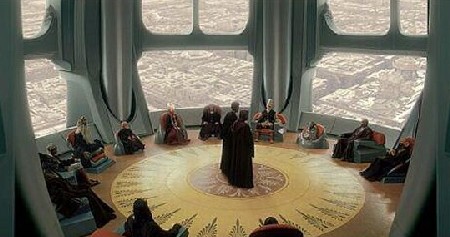
How did the Jedi order start? The chronological series starts out with the Jedi being peace-keeping monks and negotiators. The Jedi can be compared to monks but monk with weapons and the means of self-defense. Regardless of those means, they did not spend as much time fighting as they did meditating and they only used force to bring those who would threaten peace to justice by means of imprisonment. The Jedi were effective at doing such things because, by using the power of the Force, (basically God in the Star Wars Universe), they were nearly unstoppable. In short, the Jedi were warrior monks who rarely, if ever, used force. Originally, their creed focused on negotiations. Out of fear of emotional weaknesses being exploited- which was a valid fear seeing as how Anakin was exploited in Revenge of the Sith- part of their creed was to reject all forms of attachments in the physical world. This set them apart from the Sith, who exploited their own hatred and anger, and exploited the fear in others to gain power. The Jedi and the Sith represent two extreme sides: No emotions whatsoever or explicit emotions to gain power.
What is important to note about the original Jedi Order is that they relied mainly on negotiations to solve conflicts. Sometimes, if an opponent was too powerful, they would resort to ‘aggressive negotiations,’ as Anakin humorously put it, until their opponents were imprisoned and the threat negated. The Jedi Master, Yoda, was flouted as the most powerful Jedi alive due to his old age, wisdom, and immense knowledge of the Force and frequently spends his time either meditating or tutoring other young Jedi to do the same. Mace Windu said what the Jedi stand for well enough in Attack of the Clones. When asked by Palpatine if the development of a Separatist Rebellion would lead to war, Windu pointed out that there were not enough Jedi to protect the Republic if it did.
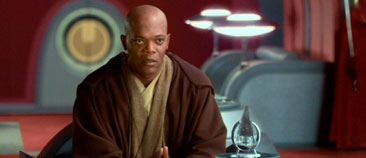
However, from Anakin’s point of view, the Jedi are evil. They lost their way and by studying the content of Star Wars, it is not hard to see where he comes from. The Jedi have lost their way and that is what led to their downfall at the hands of one of their own, not to mention a betrayal which, had they not been shortsighted, might have seen coming. Going from peace-keeper to warrior may explain just how the Jedi had changed and how one of their own, Anakin Skywalker changed with them.
Anakin Skywalker
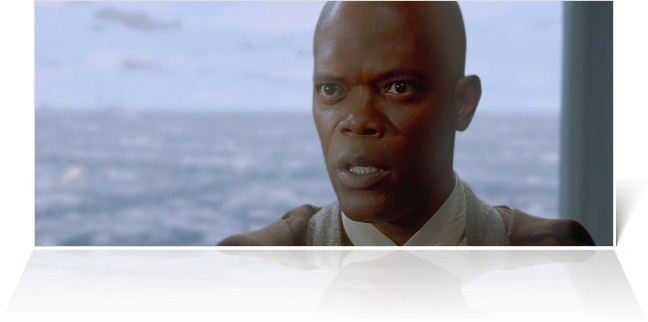
From the beginning, Anakin was touted as the Chosen One. He was believed to be the one who will bring the Force into balance. Once his old master surrogate, Qui-gon Jinn, died, he was trained by Obi-wan Kenobi. Adhering to his master’s last wishes, Obi-wan was even willing to train Anakin without the approval of the Jedi council. For ten years, Obi-wan trained Anakin but there lie the first problem. Qui-gon put in Anakin’s mind that the Force was very strong with him, Anakin could see things before they happened, he knew what to do, when to do it, and could trust his instincts more than any other Jedi. When Obi-wan trained him, he did not inspire such confidence. He frequently downplayed his abilities, said they were not in tune, frequently emphasized how young Anakin was and in so doing, Anakin felt he was being held back and was easily angered by this.
Held back or not, Anakin maintained a lot of respect for his master. As wise as Master Yoda and as powerful as Master Windu. Very high praise indeed for a master who he feels holds him back. If one counts the Clone Wars animated miniseries, Anakin was even suggested as a contender to be promoted to the rank of Jedi Knight by his master, which showed that whatever grievances may have remained were tossed aside and remedied. As a Jedi Knight, Anakin was allowed to hone his abilities without limitation. Anakin showed some independence and dissatisfaction with the Jedi Order when he did things his own way, even defied the Jedi council on certain orders which actually did more good than harm. The result: his own apprentice.
Ahsoka Tano
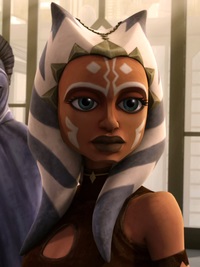
Anakin was warned by the Jedi not to form attachments but he did so. He formed two attachments, one with Padme Amidalla and another with his apprentice Ahsoka Tano. This proved to be a redeeming factor for him. Anakin, in many ways, showed that a Jedi can form attachments and still be a Jedi. Even during the Clone Wars TV series, he and Padme maintained a professional distance with each other and performed their respective duties admirably. They met in secret at times but their duties never wavered.
With his apprentice, things were a little different. He had a term of endearment for Ahsoka, frequently called her snips which would irritate her. His training gave her a very good connection with the Force. One episode titled “Assassin” actually focuses on her foresight and ability to see the future and use her knowledge to her advantage and stop misfortune from happening. Her senses grew very powerful and Anakin grew very fond of her. In one episode titled “Weapons Factory,” Anakin and Ahsoka are given a mission alongside another Jedi Master Luminara and her own apprentice. Both apprentices are presumed dead in an explosion and while Master Luminara accepted the outcome, Anakin did not. While Luminara suggested accepting their fate, Anakin was not willing to leave without his apprentice to the point Luminara suggested that if Anakin ever lost her, he would not be ready.
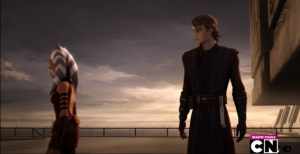
This represented a foreshadowing for later in the series. In the last arc, Ahsoka is accused of a crime by the Jedi council with overwhelming evidence against her. The only one who trusted that she was innocent was Anakin so she fled with him in pursuit. Unfortunately, the Jedi were also after her. Eventually, the real thief was caught and Ahsoka was offered her position as Jedi Student back. She denied it. Why? She lost trust in the Jedi. Where the Jedi Order was once a sacred order of monks who trusted the Force, each other, and their masters, the only one of them who maintained that trust was Anakin. Learning that the Jedi could easily betray without looking inside themselves or trusting their instincts as Anakin learned to do, Ahsoka left the Order never to return. Anakin watched her go, hurt and shocked, dealing the first blow to Anakin’s trust in the Jedi.
Pacifists
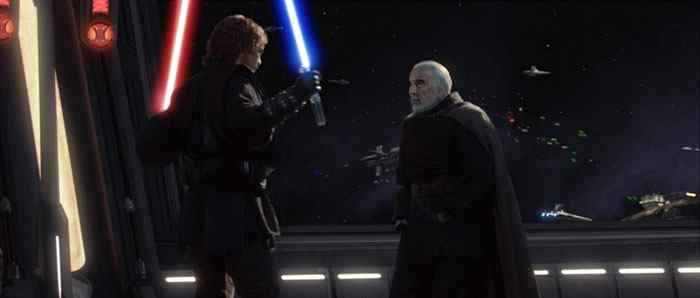
Anakin would feel this blow for years to come, including when he himself went against the Jedi creed in his own mission. The Jedi way, as said, takes prisoners. Anakin knew this as well as anybody else and he tried, though failed at times, to follow this. Upon the beginning of Revenge of the Sith, Anakin duels Count Dooku in an attempt to rescue Palpatine who was supposedly taken hostage. The duel concluded with Anakin rendering him armless. Dooku bent down in surrender as Anakin had two lightsabers on his neck to show victory. Palpatine urged Anakin to kill him but with Dooku powerless, Anakin knew it was not the right thing to do.
Nonetheless, Palpatine urged him more strongly and Anakin did it. Dooku was beheaded and Anakin felt guilty, knowing it was not the Jedi way, knowing that Dooku should’ve stood trial like anyone else. To top that, with his arm off, Dooku was powerless. He culd not use a saber nor could he use the Force. With the Jedi creed in Anakin shaken and recurring dreams about Padme’s potential death, Anakin was slowly losing trust in the Jedi way. Fearing for Padme’s life, he went to Yoda for advice. As the Jedi reject attachment, however, Yoda simply advised him to welcome potential death. Mourn them do not, miss them do not.
Mourning and missing, even grief is what makes someone human. Padme said it helped people grow. To be told not to even miss them suggests rejecting not only attachment but emotion as well. Anakin could not handle this. Padme asked to tell Obi-wan about their problem but Anakin, not trusting the Jedi to accept the attachment Anakin had formed, refused. This lack of trust led to the downfall of the Jedi but it was not only on Anakin’s head.
Betrayal
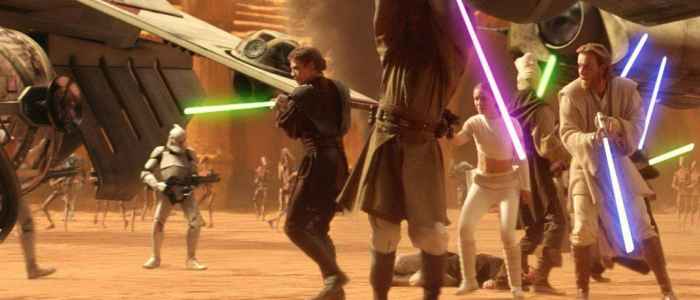
As the council and Clone troopers went to war, the first explicit contradiction of the Jedi Way made itself apparent. Where Windu once said they were keepers of the peace and specifically not soldiers, the Jedi Order shed this duty and took the Republic’s side, each one being given the rank of General. In fact, the very Jedi who said they were peace keepers was frequently called a General by the Clone Troopers. The Jedi transitioned from peace-keepers to soldiers, and soldiers for one side. Taking sides meant that the Separatist movement lost their trust in the Jedi and with no mediators or keepers of the peace, the war raged on until a single Sith Lord exploited it for all it was worth and destroyed everything.
While the Jedi taking the Republic’s side proved effective in terms of military engagement, it proved ineffective in ending the war. Going from peaceful mindsets to militant mindsets, their judgment was frequently clouded by the dark side, which to them represents oppression and war. The clouding of their judgment led to a decrease in trust. The Jedi that suffered the most from the decrease in trust was Anakin himself. Where Ahsoka was betrayed by the Jedi Order and lost her own trust, Anakin was used by the Jedi Order for their own means.
The Jedi rightfully distrusted Palpatine as a Chancellor. In spite of Obi-wan’s pleas not to ask Anakin to spy on him, they did so. Anakin grew to trust Palpatine and this had him feeling guilty. In an effort to consolidate their control over Anakin, they put him on the council but not as a member. The very position screamed of contradiction. He asked Obi-wan how one could be a council member but not on the council itself. It was outrageous and it became clearer that the Jedi, believing Anakin was too close to Palpatine, did not trust him.
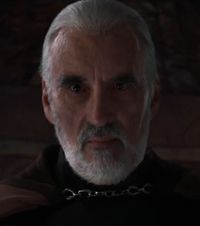
Palpatine, of course, was wise to this game and exploited Anakin’s insecurities towards the Jedi. Palpatine started teaching him about the Dark Side and its potential ability to save those Anakin loves from dying, noting that Anakin feared for Padme’s life due to a premonition. Eventually, Anakin came to the conclusion the Council feared. Palpatine was the Sith Lord Darth Sidious. The very Sith the Council was trying to track down to no avail. Realizing this as the war drew to a close, Anakin turned him in to the Jedi council in spite of the shaken trust.
This was not the first time they were told of Palpatine’s identity either. Dooku told Obi-wan himself but Obi-wan and Yoda chose not to believe him. Mace Windu accepted what Anakin revealed and said that if Anakin was right, he would’ve gained Windu’s trust. While this may seem good on Windu’s part, the fact that the two were comrades, and fought the war for three years successfully, the fact that Anakin achieved so much and was so gifted with the Force should have earned unconditional trust in the Jedi. It took this long to gain that trust. It took a startling revelation. Windu took the remaining Jedi and proceeded to Palpatine’s office to place him under arrest. As expected, Palpatine fought back.
Anakin felt guilty about killing Dooku, not to mention fearing for Padme’s life. On top of that, he was unable to trust those who did not trust him. Anakin intervened in the fight just as Mace Windu had Palpatine floored. There came the climax of the duel and a clear indication that the Jedi Order did indeed lose its way. Mace Windu showed major forms of anger and hate as he defeated Palpatine and with his saber on him, announced that the Sith’s oppression would never return. As Windu deflected the lightning Palpatine sent back at him, scarring the Chancellor, Anakin showed hints of sympathy and disturbance of how vicious things have gotten. He could not watch.
He must stand trial! It’s not the Jedi way!
When Windu was about to strike the final blow, Anakin yelled for him to stop. Insisted that Palpatine would stand trial, because killing him was not the Jedi way. This was true. Killing was not the Jedi way. It never was. Being inducted into war on the side of the Republic contradicted the Jedi way, being responsible for deaths contradicted their way, and a revered Jedi Master on the council about to kill Palpatine out of pure anger and hate was definitely not the Jedi Way. Having lost trust, Anakin cut his arm off, Palpatine struck Windu out of the window to his death and Anakin… felt regret and remorse. With a promise that power would save Padme, he continued on with his massacre, still feeling regret.
Some may argue that Mace Windu was right and Palpatine was in fact too dangerous to be left alive. However, as shown many times, it is possible to imprison a Jedi. Obi-wan was trapped by laser fields in Phantom Menace, Obi-wan was also imprisoned in Attack of the Clones. And in the Clone Wars episode Dooku Captured, even a Sith can be imprisoned. Palpatine had the misfortune of being beaten by Windu, got scarred, was weakened to a point he could barely fight back and imprisonment was not an option. The Jedi shed their title of peace keepers and became warriors willing to deal death even when imprisonment is a very possible option.
A Balanced Force
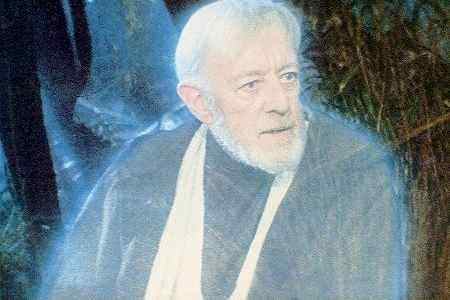
If Padme’s life was the sole reason Anakin turned to the dark side, he would have betrayed Palpatine the second she died. He did not. Anakin continued on as a Sith Lord named Darth Vader, shedding what was once Anakin Skywalker. He did so not on a quest to save Padme, as she was already dead, but as an angry machine believing that the Jedi were responsible for the destruction. As far as he was concerned, Palpatine was the better of two evils. Believing that the Jedi were to blame and what once made them Jedi had long since vanished, Anakin fulfilled the Prophecy and brought the Force into balance.
Luke Skywalker was not a Chosen One which speaks wonders of the original trilogy. The Chosen One was Luke’s villainous father. Luke did not serve the role as the ultimate hero of the film but rather his father’s redemption. Being the only literal piece of Padme Anakin had left, one can imagine the surge of emotion coursing through Vader at the time. Slowly, Anakin’s consciousness began to reemerge. As he watched his son getting tortured, Vader finished the Prophecy off by picking Palpatine up and throwing him away, destroying him once and for all.
The Prophecy that stated that Anakin would bring balance to the Force was misinterpreted as Yoda suggested. In the universe, there are two sides and two extremes: The Jedi and the Sith. The Jedi were numerous while the Sith were considered relatively nonexistent until recently. A Prophecy announcing that the Force would be brought into balance clearly suggests that the winning side, that being the Jedi, would be humbled. And they were. As only two Sith remained, two Jedi remained and once the Jedi died out, the Sith died out too and the final blow was struck not by Luke but by Anakin Skywalker.
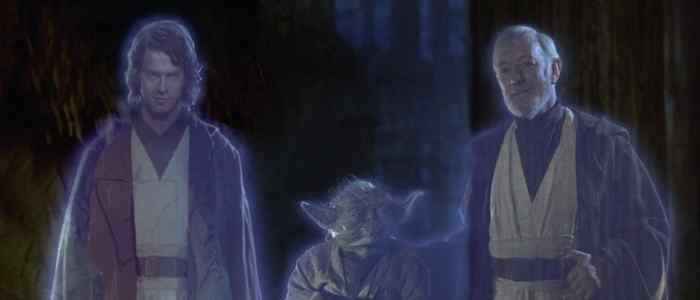
What do you think? Leave a comment.










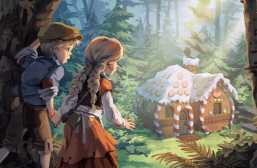
Fantastic article! Say want you will about the Star Wars prequels, but they had one of the most unique twists on the ‘chosen one” trope. Anakin was supposed to be the inspiring chosen one, when really he was being manipulated by the Emperor the whole time. So in the end, the prophesy was complete bull, now that he turned to the dark side.
I personally love the prequels but I have heard criticisms of it before. In fact, TPM had some of the best lines in all of Star Wars. In my opinion, the prophecy was as Yoda said, misinterpreted. Balance was brought equalizing the ratio of Jedi to Sith. 2. Obiwan and Yoda. When Luke came in, Obiwan died. When Yoda died, Anakin redeemed himself and Palpatine died.
I’m going to be cynical though and say that Disney will take the franchise in the same direction the prequels did, namely to eschew true storytelling in favor of unintelligent popcorn flicks for the smallest of kiddies.
Star Wars 1313 was all about liberating the franchise from this, and it got cancelled straight out the gate when Disney took over. That’s a shame, but I also understand how it’s a sound financially-motivated decision.
Star Wars isn’t cinema anymore, it’s a safe, predictable kids movie franchise. We might as well expect a clever and engaging plot from a direct-to-DVD movie entitled “117 Dalmatians: Little Spotty’s Exciting Journey”.
I hope Star Wars never loses its “for kids” vibe. That said, I’d rather it did it in the way A New Hope and Empire did it than the way Phantom Menace did it. I never want to see a for adults versio of Star Wars. That’s the way of the current crop of DC Comics and it’s just erroneus and wrong. Not saying that’s what you’re getting at here, but I want to make that point.
Star Wars has always seemed to me to have about the same appeal as the very best of the Pixar movies–intended primarily for kids, but lots there to dig into for adults. If you think about it, Star Wars essentially provided the template for Pixar.
Star Wars has always seemed to me to have about the same appeal as the very best of the Pixar movies–intended primarily for kids, but lots there to dig into for adults. If you think about it, Star Wars essentially provided the template for Pixar.
I think the Clone Wars helped them back out of isolation, so it actually revitalised the Order rather than doom it.
Interesting opinion to have. It certainly helped them out of isolation but they were out of touch with the populace and by taking sides in the war instead of attempting to keep the peace, they turned against half the galaxy.
I’ve always been of the opinion that the Jedi Order was in terminal decline at the time of TPM.
That’s certainly when it started.
Yeah it seems completely bogged down in dogma, philosophy and self-centrism. I think that is what Qui-Gon rebelled against with his ideas of the ’Living Force’ and his flaunting of the rules.
There is a lot of Zen Buddhist and Aikido philosophy in the teachings of the Jedi…but the writers were not themselves masters of those disciplines, and it’s my opinion that they got much of it wrong in their cherry-picking and recapitulation of these ideas.
It’s always been obvious that Lucas pulled a lot of the Jedi philosophy and beliefs from Eastern religions. I’m no student of Eastern Religions, but I’m familiar with the basics of Buddhism.
One thing you could point to is the aspect of meditation but meditation is a more common art not exclusive to Zen. It would be an interesting topic to look at though.
The Jedi are very much like Buddhist Shaolin monks in that they eschew personal belongings and attachments. They are holy men, trained as weapons of good to be above normal pettiness. They are meant to be more than human (or alien).
I’ve always found both the Jedi and Sith Code a fascinating study pertaining to real-life relationships and life as we can live it (not the fantasy world of Star Wars).
I think anyone who has really, honestly tried to delve into the mythos of Star Wars has to, at one point in their journey, come acorss some type of crossroads, and make the decision if this defines the way they look at the entire history of Star Wars.
The jedi were in a sense out of touch with things.
This article is exactly right in the theory!
Your article alone is making the prequels better for me already. I’m going to be thinking from your perspective next time I watch them.
I’m glad. I do think the prequels get a bad rep.
Excellent article! I’ve always found the dark side to be more interesting because the individuals like you say exploit the emotions of others. As well as their own emotions that twist their mind and hearts.
It is certainly more interesting, isn’t it? The dark side certainly has the power but the Jedi, I daresay are more compassionate. They’re just not allowed to show it.
This is actually very true and I’ve thought of little aspects of this ever since they announced the sequels, so I’m glad to see someone else speculating in the same direction.
I do believe the sequels will address this in some way. What balance to the force really means.
Disney should seriously re-edit the crap out of the prequels. Lucas had no problem taking a giant dump on the original productions by continuously “enhancing” them, then he craps on the entire legacy of the movies by making those ridiculous prequels.
I… hope they don’t. Disney is a very different style to Lucas, more likely they’ll butcher the legacy more. In any case, this is coming from someone who loves those prequels, lol
There’s some salvageable material there, they just need to remove a lot of Jake Lloyd’s performance, plus the older Anakin’s, too – change Jar Jar’s voice/dialog, remove the poop/fart jokes, add some dialog to change the story here and there and the prequels would almost be watchable.
In truth they lost their way long before the clone wars.
Do tell?
The Jedi were assholes. Windu represented the worst of it, and Yoda didn’t act much better. In Empire and Jedi I think Yoda’s dialogue makes it clear they made mistakes.
Obi-wan made clear they made mistakes too. “I thought I could instruct him just as well as Yoda. I was wrong.” Very humble and admitted to his own arrogance. Windu was pretty cool, and he was one of my favorites but of all Jedi, he displayed the most anger which is forbidden.
Great article! I particularly like the ending. I think that you have put a lot of thought into this and said what many people have missed. Balance is achieved through losses on both sides. Really well done
And that really is most of the point so I’m glad you saw it. I am quite surprised the Jedi did not think about this. They assumed the prophecy would put their side as the victors. But what is balance? It certainly is not synonymous with one side prevailing outright. With the Jedi outnumbering the Sith a hundred to one, balance to the force actually implies that the Jedi sight is about to be rolled over badly.
Awesome article. Great insight. You are completely correct in your analysis. Balance is about both sides (dark and light) being equal. I’ve always kinda wondered what the jedi were expecting to happen. Was balance for them actually being the only ones because far as they knew the sith were no more. I didn’t think about it but your right there was no other way to gain balance besides the jedi being basically destroyed. Well written article.
You’re right. Under the impression that the Sith are no more in Episode I, I’d be quite worried.
The Jedi Order had been involved in wars and military/police actions throughout it’s history, even at one time governing the Republic in a quasi-dictatorship.
You make a compelling argument! Really enjoyed the article.
The Force is a malevolent . . . er . . .force that corrupts the Sith. But their bouts of violence and chaos naturally lead to their eventual destruction and time is needed before the cycle can begin again.
I kind of disagree on the view that luke wasn’t the chosen one. Can argue the point that after the destruction of the jedi and creation of the galactic empire it was rather the sith who held the power. In fact from a military standpoint they held more power than the jedi ever did as the jedi were only ever an impartial group. I agree they were more numerous but the fact it only took two sith to bring down the entire order would suggest that even from the beginning the sith were strongest. The jedi council feared the sith and knew what threat it posessed. How do you quantify “balance”? the movies never actually go too much into what the prophecy actually meant. Did it mean balance of numbers, strength of the force.
Luke skywalker was a redemption charachter but i focus on him being more the chosen one. Anakin was just more of a fall from grace, very powerful in the force nonetheless but i just didnt get the prophetic vibe.
In anakin’s act of redemption and returning to the light side effectively neither side held sway over the other and neither light nor dark held influence throughout the galaxy and to me that is the balancing act and fits more with the intent of the prophecy.
For me films 1 to 3 set the scene or the groundwork for the middle films to actually carry out the prophecy in its full.
I once thought that Luke was the chosen one but I have recently been of the view that he isn’t. You’re right that it depends what one means by balance though. I would question whether the Empire was ever truly in power though. The Sith did rule but as Episode IV made clear, more star systems were leaving the Empire, it had a Separatist problem and the Rebels were part of that problem. With so many rebelling and leaving, can we really say that the Sith were in complete control? In that sense, balance still existed. A [position of power only means something if people actually recognize that position.
But this is all taking Lucas’s prequels at face value. Look, very well written article and an excellent command of Star Wars knowledge. But whenever approaching the prequels, the Clone Wars, any of the novelizations (anything outside the original trilogy), we have to do so with a grain of salt. It’s not revolutionary to say that the prequels are inferior, and this includes their narrative. The logic within the narrative is baffling, and so we have to look outside of that narrative. Why did the Council allow Obi-Wan to keep training Anakin? Because George Lucas needed two more movies. Why did they never suspect Palpatine was a Sith despite the overwhelming evidence?* Because the film series had to go on.
This analysis isn’t without merit but the source material (the prequels) is majorly flawed. The Jedi weren’t so much lost as Lucas didn’t know how else to tie up his story.
*The argument of whether they should have seen the Sith uprising is another discussion, but if anyone has doubts then watch this informative video: https://www.youtube.com/watch?v=ABcXyZn9xjg
To be honest, I completely disagree. The prequels are not inferior. Sure the acting sucks but the dialogue is actually really good. Yoda’s fear lecture, Maul’s revenge vow, Palpatine’s lines, etc…
The council allowed Obi-wan to train Anakin because it was Qui-gon’s wish and Obi-wan would’ve trained him without their approval. Palpatine was not suspected because he can mask his evil well. He was a fierce ally during TPM, AotC he practically implicitly manipulated Binks into giving him power, RotS, his evil was beginning to show and he was a suspect. That’s it.
Great article. I’m not another hater of George Lucas (because like you, I actually do like things about the prequels, flaws and all). But one flaw of the series as a whole is the pretty cut-and-dry approach to good vs. evil.
I’ve always loved that a lot of Expanded Universe entries really fleshed out the Jedi/Sith conflict, and added more nuance and shades of grey to what otherwise had been a pretty black and white affair in the films.
(At least, until Disney made it all non-canon lol)
I liked that post-Return of the Jedi, Luke saw how the Jedi way was old-fashioned and reworked the Code into something less restricting and, ultimately, better. Like how he preached “it’s not necessarily what you do Force powers you use, but how you use it that counts.” And he abolished the whole “no-love” rule as well. All for the better, I think.
And the Knights of the Old Republic sequel, Sith Lords, is a really interesting look at both Jedi and Sith, as well as the Force itself. Kreia is an incredibly fascinating character. I love how she actually uses the Force “as she would a poison.” Moreso as a means to an end, than something she actually takes pleasure in using, thinking it as something vile.
The Sith and Jedi both are flawed in their outlooks, and she actually thought that destroying the Force as a whole would better serve the galaxy. Which, while perhaps extreme, is a valid point. Pretty much every single major conflict in Star Wars – at least, the films – in some way can be tied to the struggle between “Light Side and Dark Side.” Would the galaxy be better off without the Force? Maybe so.
I agree completely. Unfortunately, I have not read the EU to make more arguments. But I’m glad you like the prequels. I disagree that the Force needs to go but that’s another topic.
(as for Disney and non-canon, if these movies come out and people don’t like them, some will just keep the classic books and forget the sequels. It’s not beyond them.)
the idea of balance consists of light and dark or good and evil. star wars sure has a lot of botg. what i find interesting is the characters’ struggle to do what’s ‘right’ even if it’s for the ‘wrong’ reasons,
Interestingly enough, The Sith’s millennial rise to power mirrored a millennial decline in the power and influence of The Jedi. Funny how that light side vs. dark side thing works…
As Ilse Hutcherson says, yes, there are a lot of parallels. The trilogies mirror each other in this same way the rise and fall of good vs. evil. The first film illustrating characters and roles (Anakin and Luke, the second film going somewhere completely different (Clone Wars and Solo) and the final films showing numerous good defeating little evil. The films are brilliant, especially for being done 22 years apart (1977, 1999).
Well, while they do seem to parallel each other in that way, I’m not sure about the last part. Little good defeating little evil isn’t so prevalent in the RotS when Anakin becomes evil, Palpatine orders all the Jedi killed and we’re all left with a bunch of dead kids.
While reading this article, I was reminded of the Yin Yang symbol of Taoism: light is not entirely good and darkness is not entirely bad. Each side as a bit of the other within them, and both sides are in constant flux. Eventually, when one side becomes too powerful, the other fights back and evens things out. Kind of like how the Jedi’s power, who went from peacekeepers to warriors by siding with the Republic in the Clone Wars, was checked by their near extinction at the hands of the Sith.
Loved the article! I’ve always thought that the Jedi order, while not entirely evil, had become detached and distanced from the force. Its tight structure and repression of emotion made their ability to use the force narrow, as was their perspective. I think in the upcoming movies, there will be an emphasis on finding the thin line between the light and the dark sides, allowing people to obtain the full power of the Force. Or at least, this is my hope!
As Mace Windu held Palpatine powerless after their anticlimactic duel, the fate of both the Jedi and the Sith rested in Anakin’s hands (well, in his one human hand I suppose). Is his decision to stop Windu from killing Palpatine vested in the necessity of justice? Are his motives nobles? I certainly say they are not. He is thinking of Padme, he is thinking of losing her if he loses Palpatine. His selfishness and insecurity led him into the relationship, a relationship that compromises his ability to think rationally and objectively as a Jedi should. His dishonesty forfeits his integrity and is the ultimate determinant in allowing the Sith to rise and the Jedi to fall. Any indication of justice within his actions is misplaced.
Well you think the the Jedi lost their way during the clone wars. I believe their way was already lost by that time. They lost their way when they massacrated the Sith out of fear ironically the same thing they say leads to the dark side so basically the jedi represent the Dark Side more than the Sith. Also the Jedi see themselves as above anyone else and cannot be bother with most things that happen around them. They are basically robots, beings without emotions which follow orders without any judgement on whether they are right or wrong. They kidnap children mind control whomever they like … yeah the jedi are the evil. On contrast most of the acts of aggression from the Sith are against the jedi and their allies. And of course whenever I say that the empire did a lot of good and is better than the jedi republic (not withstanding that without Luke meddling the invasion of the Vong would have been stopped) someone mentions the wooky because of course from the tens of lifeforms that faired better under the empire just the useless wookies mattered.
This was an extremely interesting and introspective article. I thoroughly enjoyed reading the insight that you provided in regards to the lost path of the Jedi. I concur with the idea that the Jedi have lost their way; however, I believe that it was crucial for the Jedi to join sides with the Republic throughout the clone wars, and become soldiers as well as generals to the clone army. If the Jedi had not joined forces with the Galactic Republic and fought against the Confederacy of Independent Systems (CIS), then the CIS would have clearly won, because the clone troopers alone would have been defeated by Count Dooku’s immense battle droid army, especially due to the massive secession of systems from the Galactic Empire. If the Jedi had not joined the Galactic Empire, and taken on the role of General, as well as soldiers, in order to guide the clone troopers and fight against the CIS, then it would have been entirely up to the clone troopers to prevent the CIS from taking over the galaxy. Also, the Jedi initially DID attempt to negotiate with the Trade Federation, because the Jedi, as you stated: “are peace-keeping monks and negotiators,” so Qui-Gon Jinn and his apprentice Obi-Wan Kenobi were sent to attempt and negotiate with the Trade Federation, but instead of the Trade Federation consenting and attempting to negotiate with the two Jedi, the Trade Federation attempted to have Qui-Gon and Obi-Wan killed. This resulted, years later, and after more battles, etc. in Jedi Master Dooku resigning from the Jedi Order in order to join and become the apprentice of Darth Sidious, and together the two Sith’s, through the work of the Trade Federation and the separatists, form an entire battle droid army,which would have most likely destroyed the Galactic Republic had the Jedi’s not stepped in with the clone army to fight against the large battle droid army, and against count dooku as well. Proving that even with the Jedi assisting the clone army in the clone wars, that Count Dooku and Darth Sidious, as well as the Trade Federation and CIS wound up with the upper hand. Imagine what would’ve happened had the Jedi not stepped in when they did. Aside from my disagreement about the Jedi forming an alliance with the Galactic Republic, I do agree that the Jedi Order is completely out of whack. I think that if the Jedi were to have made Anakin a Jedi master in Revenge of the Sith that Anakin would have begun to trust the Jedi once again, and helped guide the Jedi Order back to it’s original function/purpose. I think Mace Windu had a lot to due with Anakin’s growing mistrust of the Jedi. Overall, I think that this description and analysis of how the Jedi Order has lost its path was very well executed and clearly very well researched! Excellent work!
Great article! I enjoyed reading it in the wake of The Force Awakens
Great article. I grew up watching the prequels but it wasn’t until I hit my teenage years that I really understood the meaning behind all that took place. Revenge of the Sith is an absolute favorite, and while in the modern tropes of cinemas there have been many Anakin Skywalkers, you can’t deny the impact it had to see what Anakin’s character went through. The Clone Wars animated series further compounded the overall picture with intricate details showing really how disillusioned the jedi had become.
I have always been a huge fan of Star Wars and have watched all forms of related media. Having recently read The Dark Lord Trilogy I was immediately drawn to this article.The novelizations add even more weight to the decisions and downfall of Anakin which in large part is not his fault but rather that of an arrogant Jedi Council. Having completed the novella, i feel no sympathy towards the Jedi council for the doom they led themselves into.
As much as Yoda advised about the fear that he sensed within Anakin and how it could lead him to the dark side and what not, the Jedi Council weren’t humble enough to accept their own fear of being wrong about Anakin’s potential and character leading to them losing the Chosen One and causing the force to mutually bring balance to the world of Star Wars, not by eradicating the Sith, but rather a necessary “recycling” of the Jedi Order.
These are some interesting ideas of Star Wars’s lore.